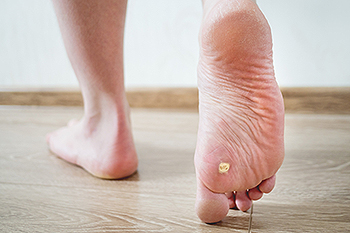6650 Frankford Ave
Philadelphia, PA 19135

Sometimes, an individual’s feet may become itchy during the middle of the night. This may be caused by a case of dry skin or some other medical condition. Since itching sensations during bedtime can be particularly troublesome and disruptive to sleep, there are certain things you might consider doing to prevent this from happening. Most importantly, an individual might consider applying an everyday foot moisturizer to the feet before bed at night. Lotions that contain menthol might be particularly helpful because of the cooling sensation that it produces. If the skin on the feet feels especially dry, an individual might even opt for a more significant, heavy-duty cream for the feet. If you feel itchy at night, contact a podiatrist today for more tips about foot lotion.
Everyday foot care is very important to prevent infection and other foot ailments. If you need your feet checked, contact John M. Fanelly, DPM from Northeast Philadelphia. Our doctor can provide the care you need to keep you pain-free and on your feet.
Everyday Foot Care
Often, people take care of their bodies, face and hair more so than they do for their feet. But the feet are a very important aspect of our bodies, and one that we should pay more attention to. Without our feet, we would not be able to perform most daily tasks.
It is best to check your feet regularly to make sure there are no new bruises or cuts that you may not have noticed before. For dry feet, moisturizer can easily be a remedy and can be applied as often as necessary to the affected areas. Wearing shoes that fit well can also help you maintain good foot health, as well as making it easier to walk and do daily activities without the stress or pain of ill-fitting shoes, high heels, or even flip flops. Wearing clean socks with closed shoes is important to ensure that sweat and bacteria do not accumulate within the shoe. Clean socks help to prevent Athlete’s foot, fungi problems, bad odors, and can absorb sweat.
If you have any questions please feel free to contact our office located in Philadelphia, PA . We offer the newest diagnostic and treatment technologies for all your foot and ankle needs.

Sesamoiditis is a particular kind of foot condition that primarily affects the sesamoid bones. These tiny bones are located in the ball of the foot, and this condition occurs when the bones become inflamed. The inflammation commonly develops from overuse. If you suspect that you have sesamoiditis, you can visit a podiatrist who might conduct an examination to diagnose the condition. Typically, a podiatrist will search for signs of tenderness or pain in the affected area of the foot. A diagnosis may be premised on symptoms that a patient feels, such as swelling and inflammation. Additionally, medical professionals have various imaging tools at their disposal to diagnose sesamoiditis. These include performing an X-ray, MRI, CT scan, or bone scan. Schedule an appointment with a podiatrist today to receive a diagnosis for a suspected case of sesamoiditis.
Sesamoiditis is an unpleasant foot condition characterized by pain in the balls of the feet. If you think you’re struggling with sesamoiditis, contact John M. Fanelly, DPM of Northeast Philadelphia. Our doctor will treat your condition thoroughly and effectively.
Sesamoiditis
Sesamoiditis is a condition of the foot that affects the ball of the foot. It is more common in younger people than it is in older people. It can also occur with people who have begun a new exercise program, since their bodies are adjusting to the new physical regimen. Pain may also be caused by the inflammation of tendons surrounding the bones. It is important to seek treatment in its early stages because if you ignore the pain, this condition can lead to more serious problems such as severe irritation and bone fractures.
Causes of Sesamoiditis
Treatment for sesamoiditis is non-invasive and simple. Doctors may recommend a strict rest period where the patient forgoes most physical activity. This will help give the patient time to heal their feet through limited activity. For serious cases, it is best to speak with your doctor to determine a treatment option that will help your specific needs.
If you have any questions please feel free to contact our office located in Philadelphia, PA . We offer the newest diagnostic and treatment technologies for all your foot and ankle needs.

Many people who develop stress fractures often continue to run through the pain that this foot condition can cause. It is a hairline fracture and may be more prevalent among people who have osteoporosis. The foot bones absorb the stress of the body, and this can easily occur if proper warmups and cool-downs are not performed. Symptoms that are generally associated with stress fractures include bruising, swelling, and tenderness in addition to difficulty in completing daily activities. Some factors can contribute to incurring a stress fracture. These can consist of having previous fractures, a lack of vitamin D, or running and jumping on uneven surfaces. An MRI is often needed to properly diagnose a stress fracture and an X-ray may follow. If you feel that you have developed this type of fracture, please consult with a podiatrist who can guide you toward the correct treatment techniques, which often begin with resting and elevating the affected foot.
Stress fractures occur when there is a tiny crack within a bone. To learn more, contact John M. Fanelly, DPM from Northeast Philadelphia. Our doctor can provide the care you need to keep you pain free and on your feet.
How Are They Caused?
Stress fractures are the result of repetitive force being placed on the bone. Since the lower leg and feet often carry most of the body’s weight, stress fractures are likely to occur in these areas. If you rush into a new exercise, you are more likely to develop a stress fracture since you are starting too much, too soon. Pain resulting from stress fractures may go unnoticed at first, however it may start to worsen over time.
Risk Factors
Stress fractures do not always heal properly, so it is important that you seek help from a podiatrist if you suspect you may have one. Ignoring your stress fracture may cause it to worsen, and you may develop chronic pain as well as additional fractures.
If you have any questions, please feel free to contact our office located in Philadelphia, PA . We offer the newest diagnostic and treatment technologies for all your foot care needs.

Plantar warts grow inward on the sole of the foot as a result of the weight the feet endure from standing and walking throughout the day. A plantar wart is a specific strain of the human papillomavirus (HPV) and is contagious. It lives and thrives in warm and moist environments, which often include public swimming pools and locker rooms. Patients with a weakened immune system may be more susceptible to getting a plantar wart. This wart appears as a hardened area of the skin on the bottom of the foot and may have small black dots in the center. The warts can cause severe pain and discomfort, and prompt medical attention is often needed for relief. Part of the diagnosis process may consist of cutting away a small area of the wart and sending it to a lab for a biopsy. If you have developed a plantar wart, it is strongly advised that you confer with a podiatrist who can offer you the correct treatment options for relief.
Plantar warts can be very uncomfortable. If you need your feet checked, contact John M. Fanelly, DPM from Northeast Philadelphia. Our doctor will assist you with all of your foot and ankle needs.
About Plantar Warts
Plantar warts are the result of HPV, or human papillomavirus, getting into open wounds on the feet. They are mostly found on the heels or balls of the feet.
While plantar warts are generally harmless, those experiencing excessive pain or those suffering from diabetes or a compromised immune system require immediate medical care. Plantar warts are easily diagnosed, usually through scraping off a bit of rough skin or by getting a biopsy.
Symptoms
Treatment
To help prevent developing plantar warts, avoid walking barefoot over abrasive surfaces that can cause cuts or wounds for HPV to get into. Avoiding direct contact with other warts, as well as not picking or rubbing existing warts, can help prevent the further spread of plantar warts. However, if you think you have developed plantar warts, speak to your podiatrist. He or she can diagnose the warts on your feet and recommend the appropriate treatment options.
If you have any questions please feel free to contact our office located in Philadelphia, PA . We offer the newest diagnostic and treatment technologies for all your foot and ankle needs.